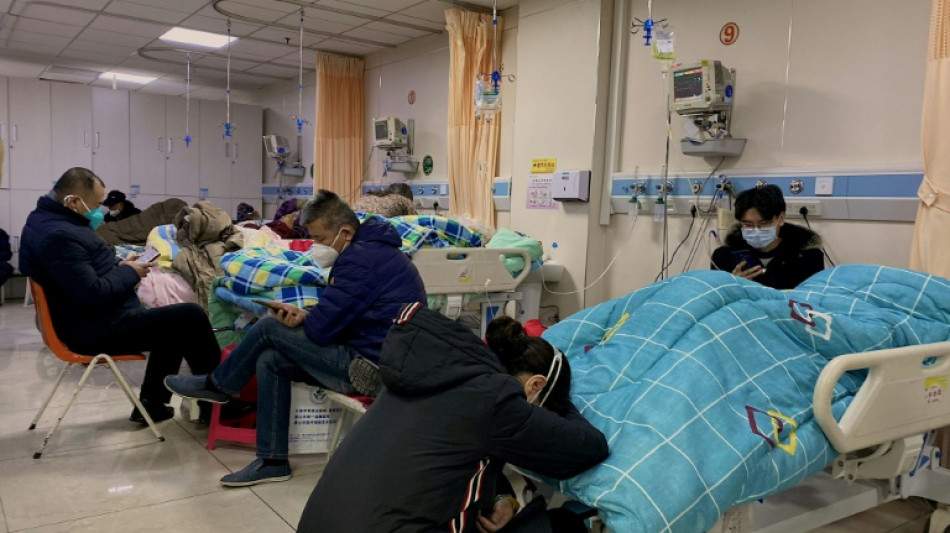
-
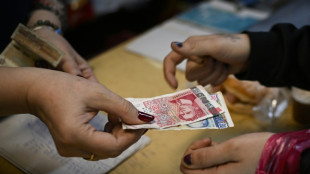 Bulgaria adopts euro amid fear and uncertainty
Bulgaria adopts euro amid fear and uncertainty
-
Giannis triumphant in NBA return as Spurs win streak ends

-
 How company bets on bitcoin can backfire
How company bets on bitcoin can backfire
-
Touadera on path to third presidential term as Central African Republic votes

-
 'Acoustic hazard': Noise complaints spark Vietnam pickleball wars
'Acoustic hazard': Noise complaints spark Vietnam pickleball wars
-
Iraqis cover soil with clay to curb sandstorms
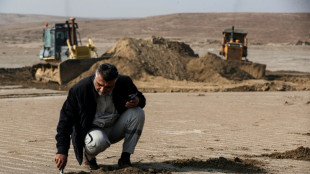
-
 Australia's Head backs struggling opening partner Weatherald
Australia's Head backs struggling opening partner Weatherald
-
'Make emitters responsible': Thailand's clean air activists
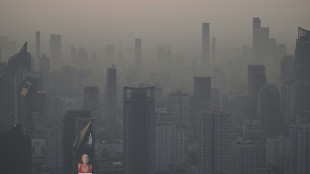
-
 Zelensky looks to close out Ukraine peace deal at Trump meet
Zelensky looks to close out Ukraine peace deal at Trump meet
-
MCG curator in 'state of shock' after Ashes Test carnage

-
 Texans edge Chargers to reach NFL playoffs
Texans edge Chargers to reach NFL playoffs
-
Osimhen and Mane score as Nigeria win to qualify, Senegal draw

-
 Osimhen stars as Nigeria survive Tunisia rally to reach second round
Osimhen stars as Nigeria survive Tunisia rally to reach second round
-
How Myanmar's junta-run vote works, and why it might not
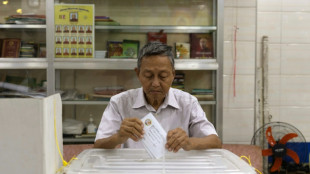
-
 Watkins wants to sicken Arsenal-supporting family
Watkins wants to sicken Arsenal-supporting family
-
Arsenal hold off surging Man City, Villa as Wirtz ends drought

-
 Late penalty miss denies Uganda AFCON win against Tanzania
Late penalty miss denies Uganda AFCON win against Tanzania
-
Watkins stretches Villa's winning streak at Chelsea

-
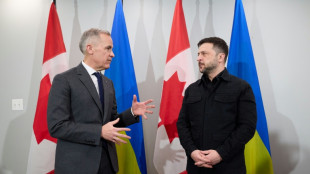 Zelensky stops in Canada en route to US as Russia pummels Ukraine
Zelensky stops in Canada en route to US as Russia pummels Ukraine
-
Arteta salutes injury-hit Arsenal's survival spirit

-
 Wirtz scores first Liverpool goal as Anfield remembers Jota
Wirtz scores first Liverpool goal as Anfield remembers Jota
-
Mane rescues AFCON draw for Senegal against DR Congo

-
 Arsenal hold off surging Man City, Wirtz breaks Liverpool duck
Arsenal hold off surging Man City, Wirtz breaks Liverpool duck
-
Arsenal ignore injury woes to retain top spot with win over Brighton

-
 Sealed with a kiss: Guardiola revels in Cherki starring role
Sealed with a kiss: Guardiola revels in Cherki starring role
-
UK launches paid military gap-year scheme amid recruitment struggles

-
 Jota's children join tributes as Liverpool, Wolves pay respects
Jota's children join tributes as Liverpool, Wolves pay respects
-
'Tired' Inoue beats Picasso by unanimous decision to end gruelling year

-
 Thailand and Cambodia declare truce after weeks of clashes
Thailand and Cambodia declare truce after weeks of clashes
-
Netanyahu to meet Trump in US on Monday

-
 US strikes targeted IS militants, Lakurawa jihadists, Nigeria says
US strikes targeted IS militants, Lakurawa jihadists, Nigeria says
-
Cherki stars in Man City win at Forest

-
 Schwarz records maiden super-G success, Odermatt fourth
Schwarz records maiden super-G success, Odermatt fourth
-
Russia pummels Kyiv ahead of Zelensky's US visit

-
 Smith laments lack of runs after first Ashes home Test loss for 15 years
Smith laments lack of runs after first Ashes home Test loss for 15 years
-
Russian barrage on Kyiv kills one, leaves hundreds of thousands without power

-
 Stokes, Smith agree two-day Tests not a good look after MCG carnage
Stokes, Smith agree two-day Tests not a good look after MCG carnage
-
Stokes hails under-fire England's courage in 'really special' Test win

-
 What they said as England win 4th Ashes Test - reaction
What they said as England win 4th Ashes Test - reaction
-
Hong Kongers bid farewell to 'king of umbrellas'

-
 England snap 15-year losing streak to win chaotic 4th Ashes Test
England snap 15-year losing streak to win chaotic 4th Ashes Test
-
Thailand and Cambodia agree to 'immediate' ceasefire

-
 Closing 10-0 run lifts Bulls over 76ers while Pistons fall
Closing 10-0 run lifts Bulls over 76ers while Pistons fall
-
England 77-2 at tea, need 98 more to win chaotic 4th Ashes Test

-
 Somalia, African nations denounce Israeli recognition of Somaliland
Somalia, African nations denounce Israeli recognition of Somaliland
-
England need 175 to win chaotic 4th Ashes Test

-
 Cricket Australia boss says short Tests 'bad for business' after MCG carnage
Cricket Australia boss says short Tests 'bad for business' after MCG carnage
-
Russia lashes out at Zelensky ahead of new Trump talks on Ukraine plan

-
 Six Australia wickets fall as England fight back in 4th Ashes Test
Six Australia wickets fall as England fight back in 4th Ashes Test
-
New to The Street Show #710 Airs Tonight at 6:30 PM EST on Bloomberg Television


Soaring Covid cases shine light on China's healthcare gap
Understaffed and underfunded clinics stand half-empty in parts of the Chinese countryside even as hospitals in major cities heave under an unprecedented Covid wave -- an illustration of the stark disparities in the country's healthcare system.
Visits by AFP journalists in the past two weeks have revealed sharp differences in demand for urban and rural hospitals in parts of northern China as many in the countryside head to big cities for a quality of care they simply can't get closer to home.
In one of the world's most unequal economies, China's centralised healthcare system drives money and resources towards urban hospitals at the expense of rural ones, a disparity that has become all the more intense as cases surge.
In the capital Beijing and the northern megacity of Tianjin, emergency wards have been so overwhelmed that dozens of mostly elderly patients have been accommodated on gurneys in public areas.
Crammed shoulder to shoulder and gasping for breath, many were hooked up to intravenous drips or oxygen tanks while machines monitored their vital signs. A few appeared unconscious or unresponsive.
Yet in the neglected rural town of Xin'an, the sparsely equipped local hospital was operating at well below full capacity.
In a poorly heated room near reception, around half a dozen elderly people huddled in thick overcoats, drips protruding from their arms.
But most of the seats were unoccupied, and the pressure on staff appeared far lower than their municipal counterparts.
- 'Lack of progress' -
"What we are seeing in rural China epitomises the lack of progress in China's healthcare reform," said Yanzhong Huang, senior fellow for global health at the Council of Foreign Relations, a nonpartisan US think tank.
"People dissatisfied with the poor quality of rural healthcare will bypass (local providers) to seek care in urban hospitals."
As the initial wave starts to ebb, the pressure on some facilities may be receding -- even as the seriously sick continue to flock to municipal institutions.
Many rural residents, meanwhile, struggle for nearby access to doctors and medicines, and public health literacy is often patchy.
A local shopkeeper in Xin'an said a Covid outbreak had swept through the settlement of around 30,000 people in December, but "the worst of it has passed".
And hospital staff and local residents there said those requiring treatment for severe illness usually made the 90-minute journey up the highway to Tianjin or pushed on to Baoding, a city some 200 kilometres away where a recent outbreak overwhelmed hospitals.
Medical services in mid-size municipalities also appear to be less stretched than in China's megacities.
In Tangshan -- a smaller industrial city of 7.7 million people -- the scene was calmer than that in Tianjin about two hours away.
Around two dozen patients of advanced age filled the resuscitation ward of a central hospital, with one nurse saying they had "all tested positive" for Covid.
Only three or four patients occupied makeshift beds in the corridors outside.
- Far from over -
Chinese authorities have said in recent days that the first wave of infections has hit a peak in cities including Beijing and Tianjin.
But the end is far from near, with officials warning of a multi-pronged outbreak in the coming weeks as city workers return to their rural hometowns during the winter travel season.
"To some extent, rural patients may have put extra strains on urban healthcare institutes," said Xi Chen, an associate professor at the Yale School of Public Health.
"However, unlike in urban areas, this wave of the Omicron outbreak has not reached its peak in rural China," he added
"Things may get significantly worse as migrants start to return to rural communities."
S.F.Warren--AMWN



